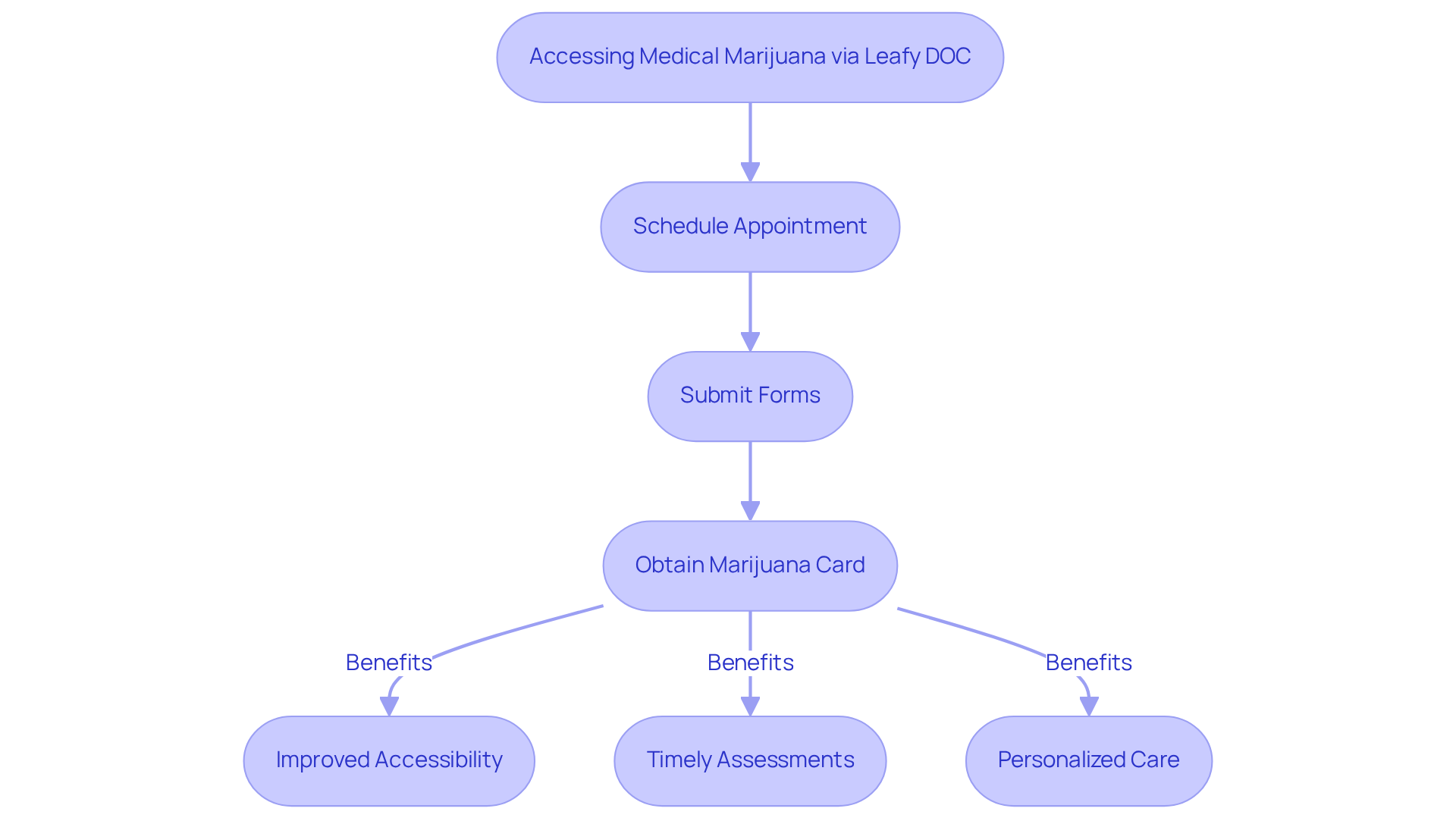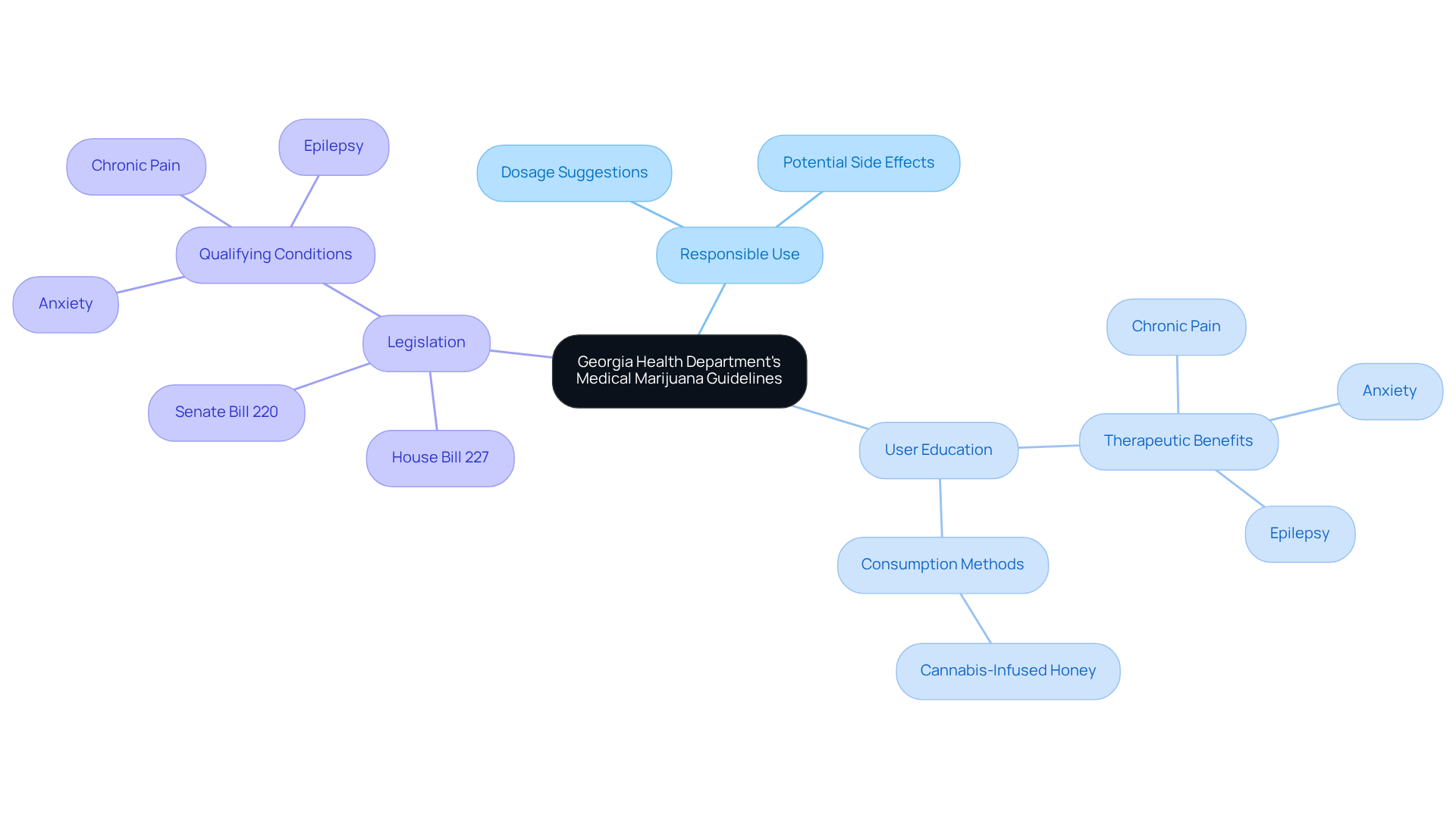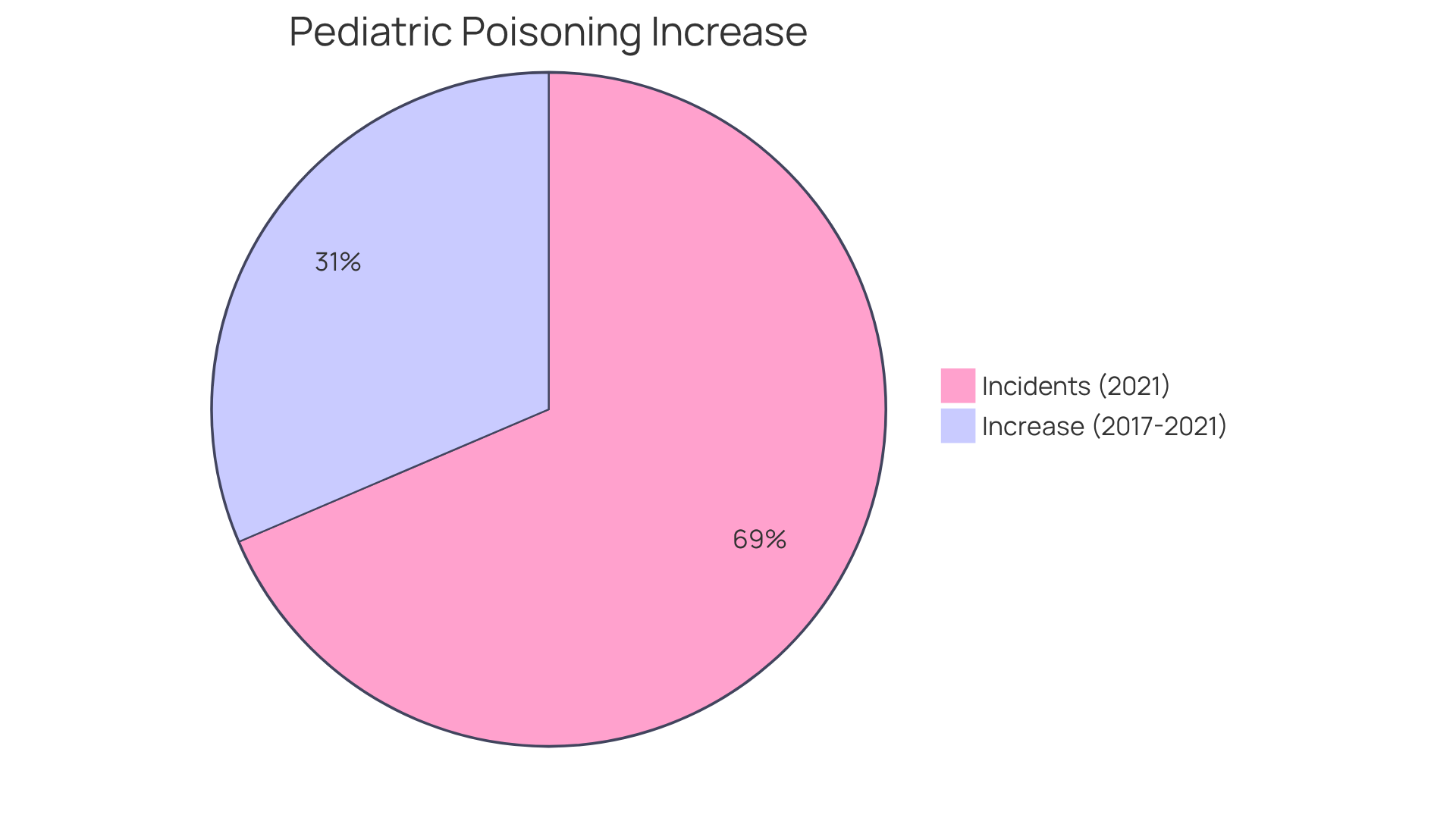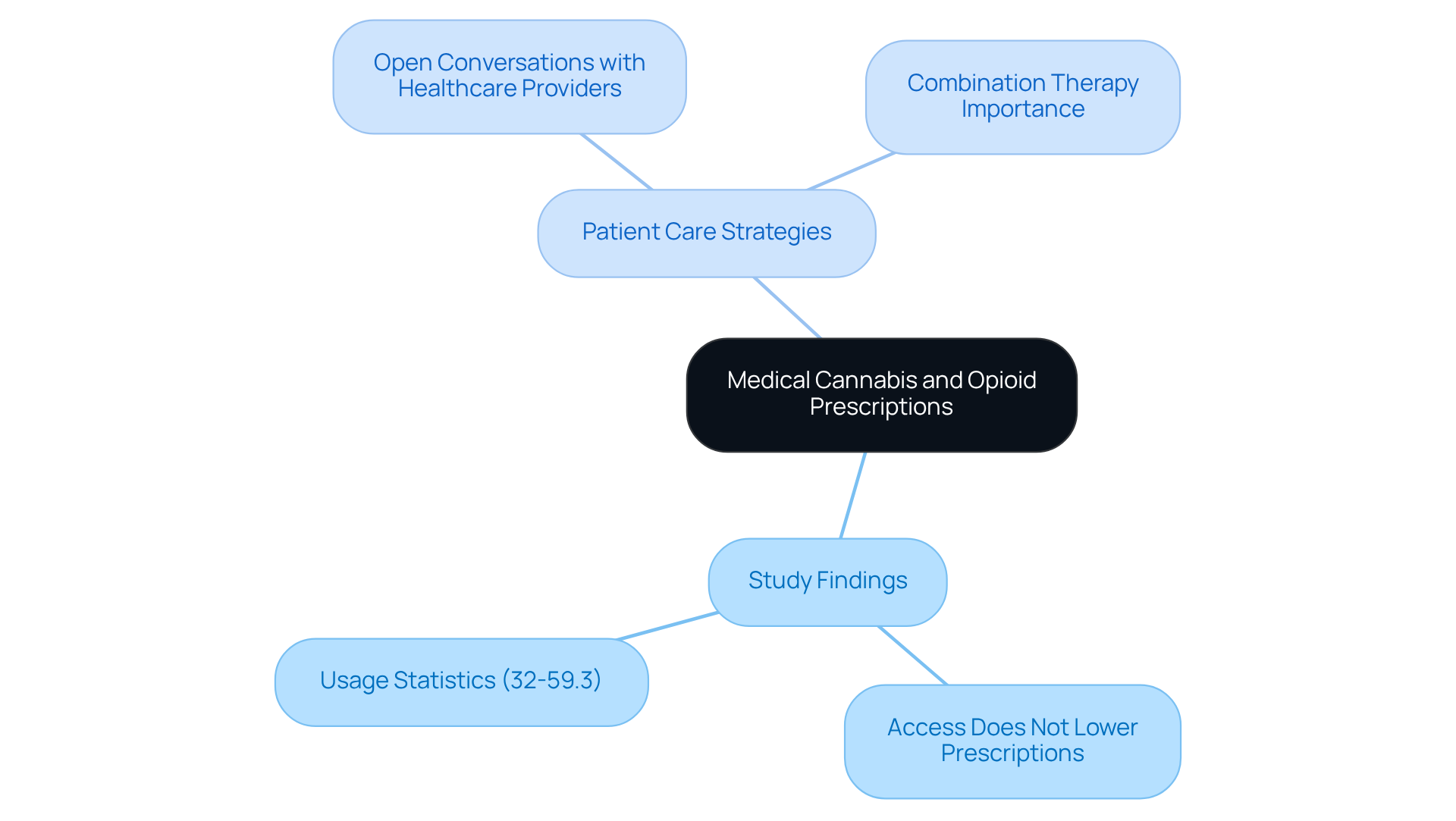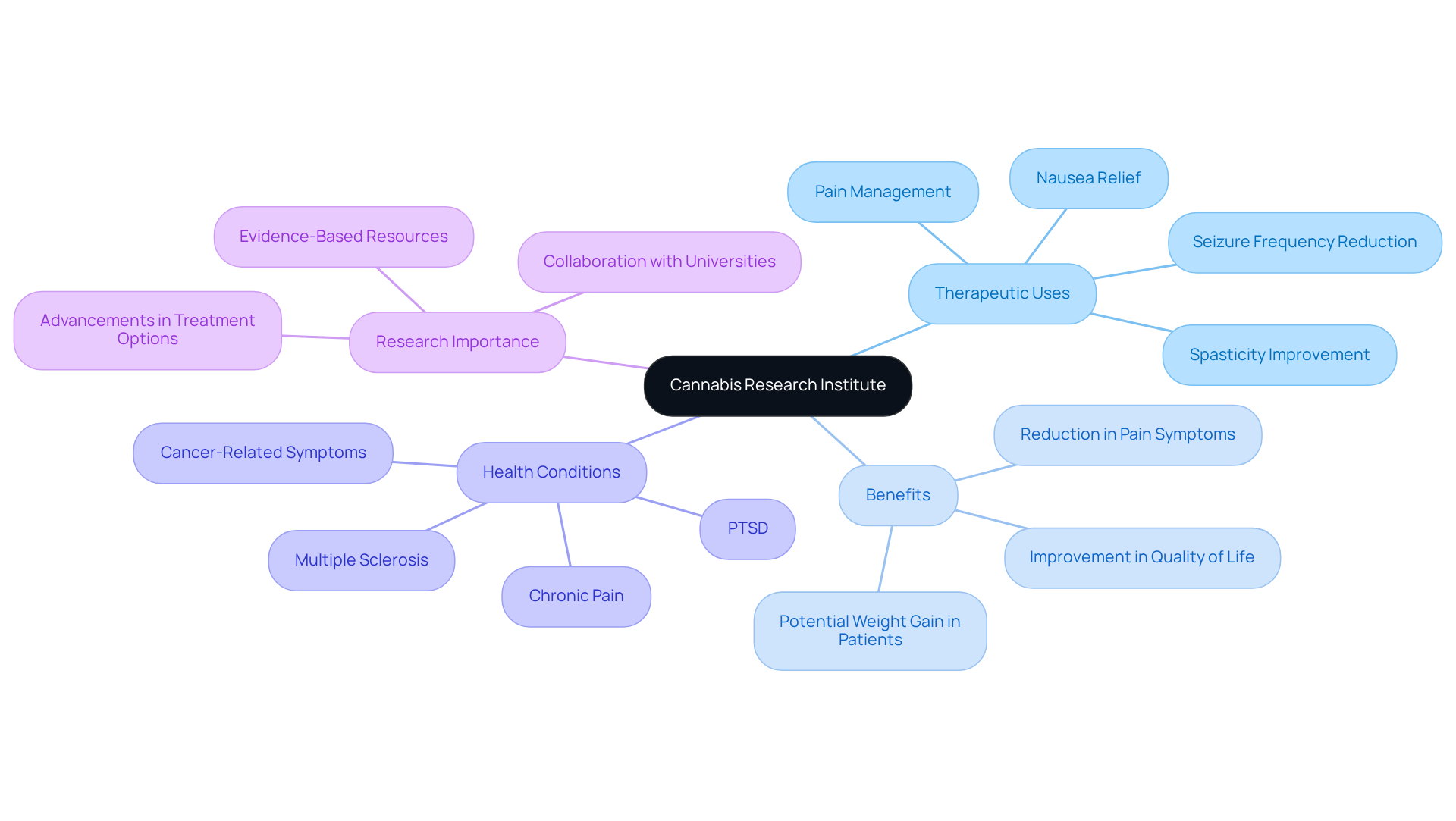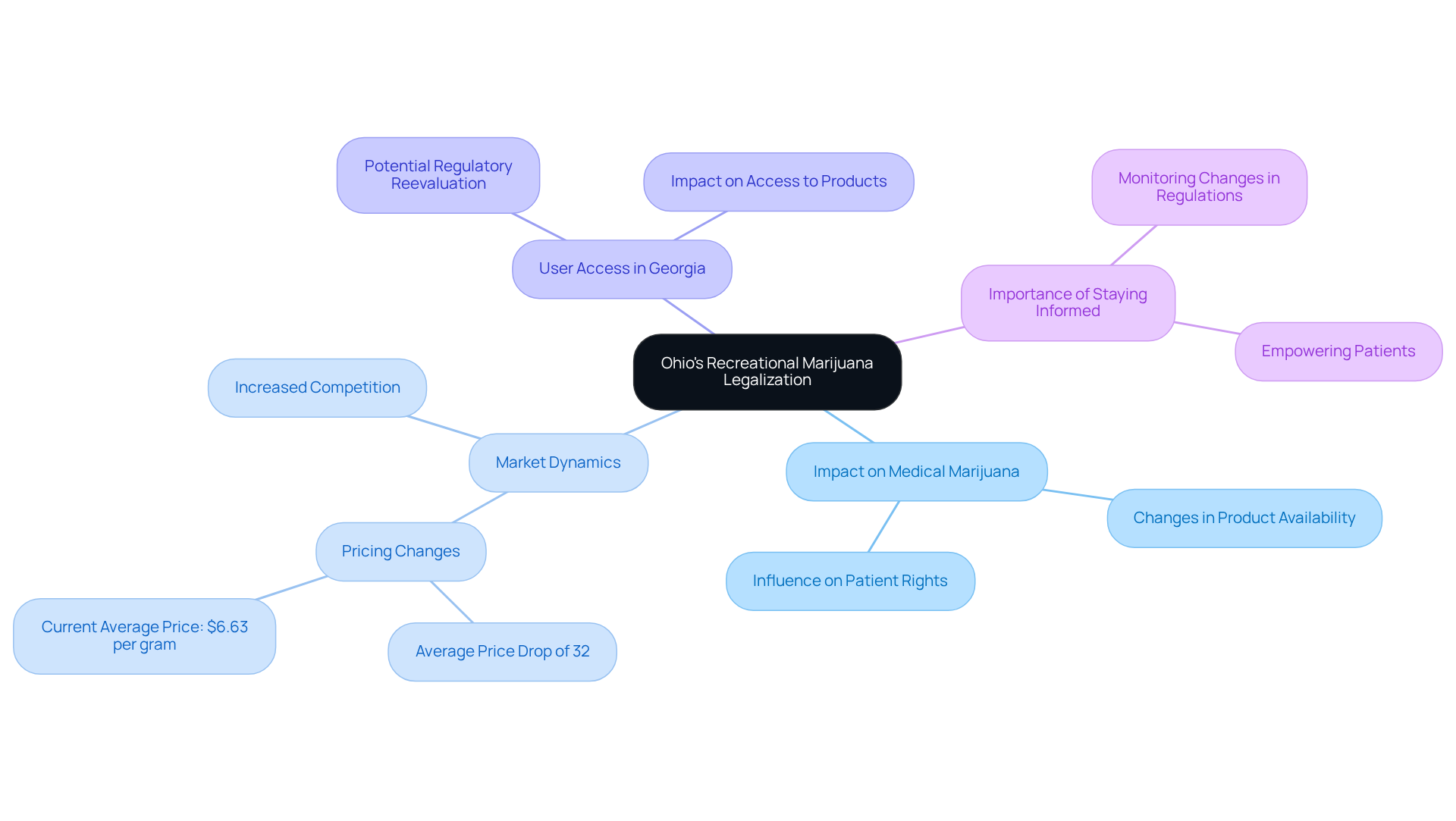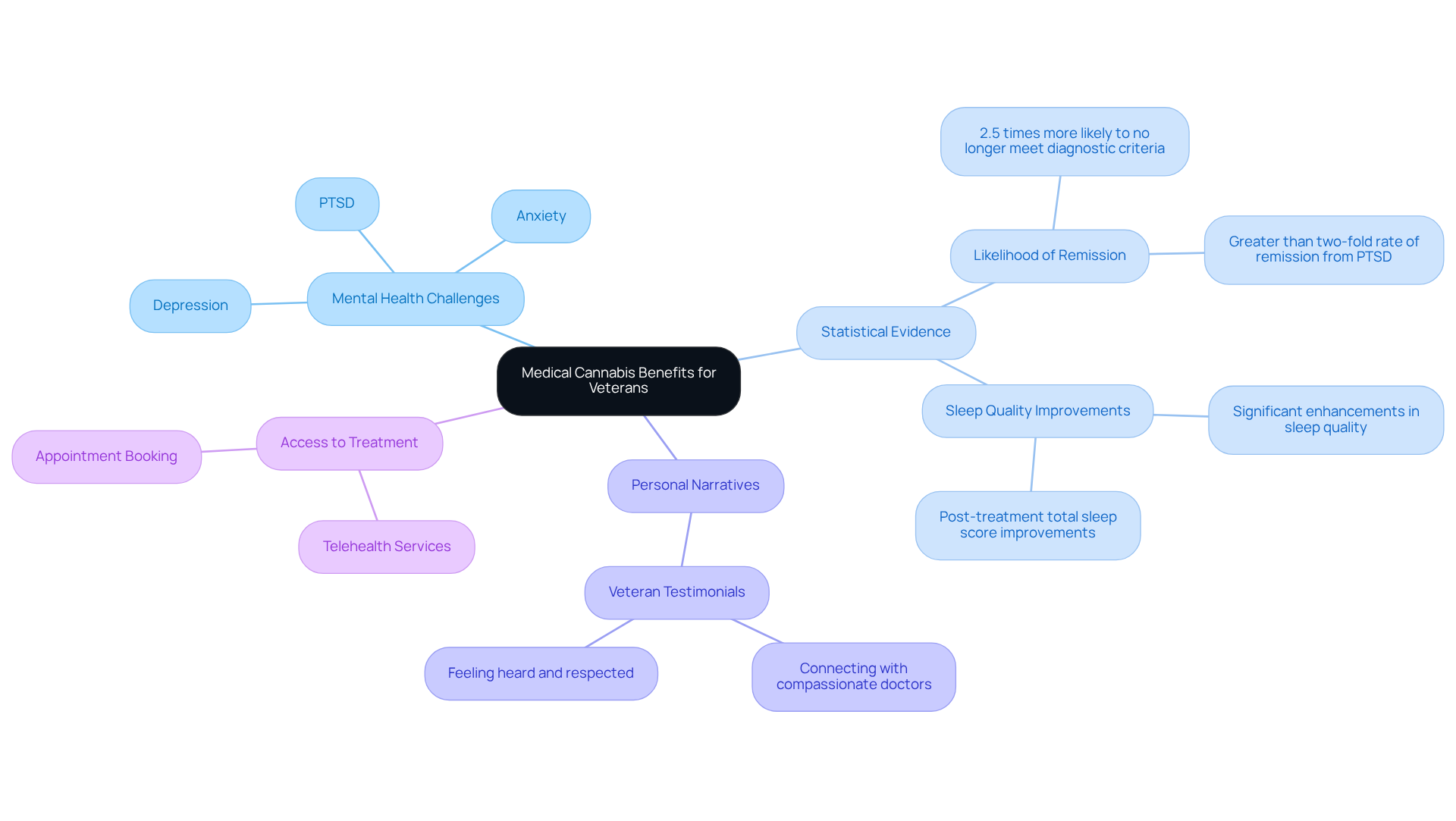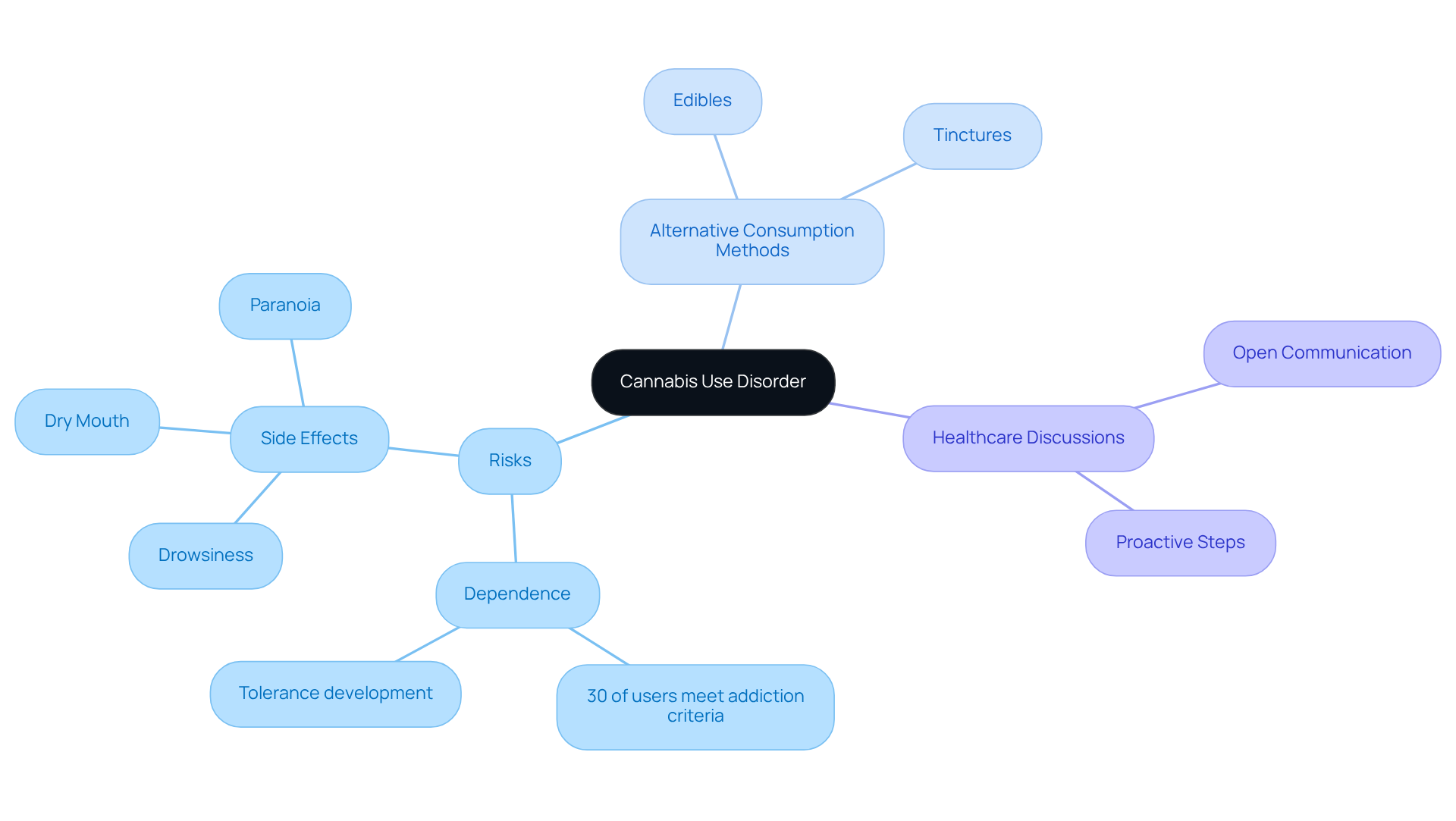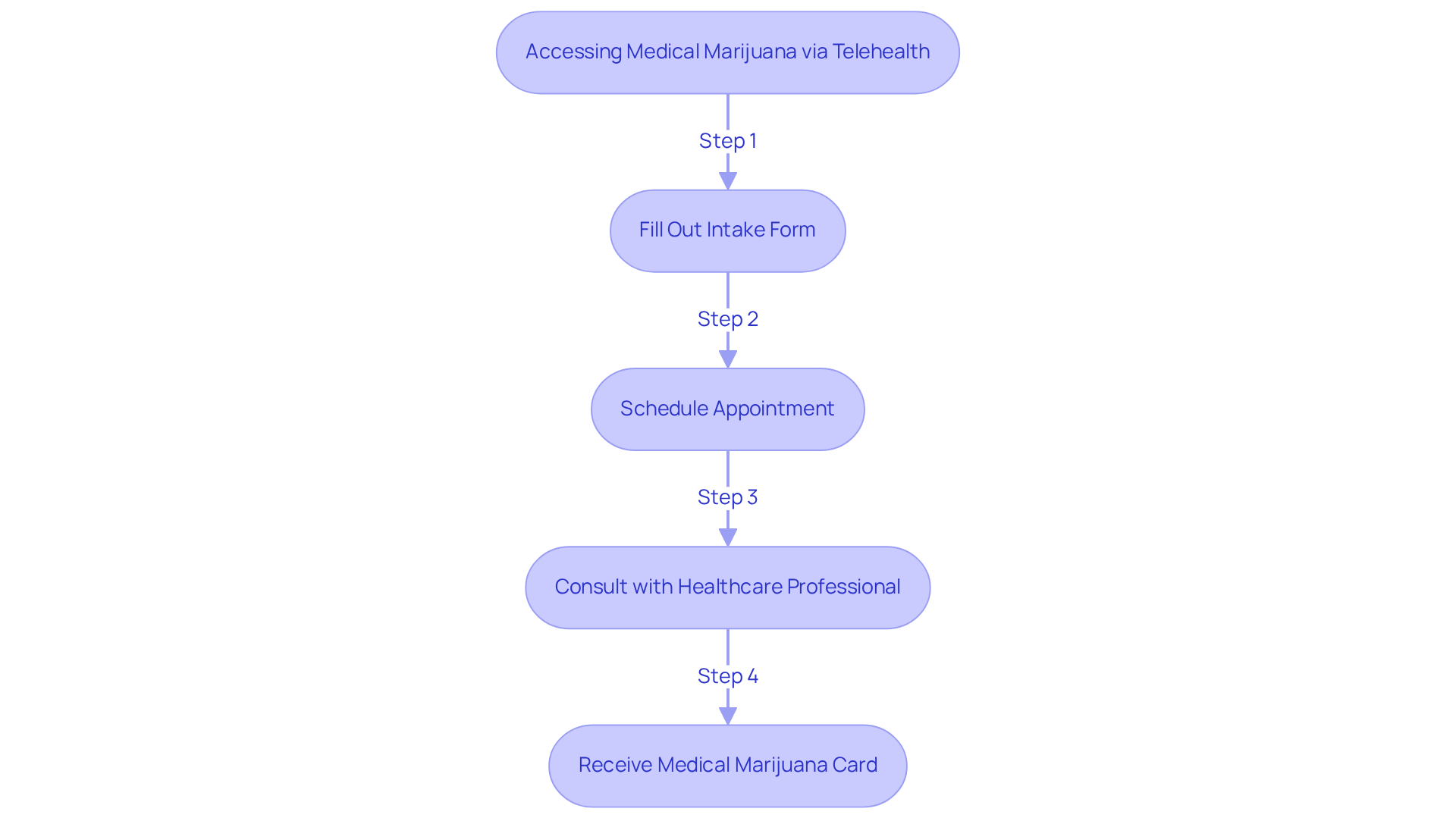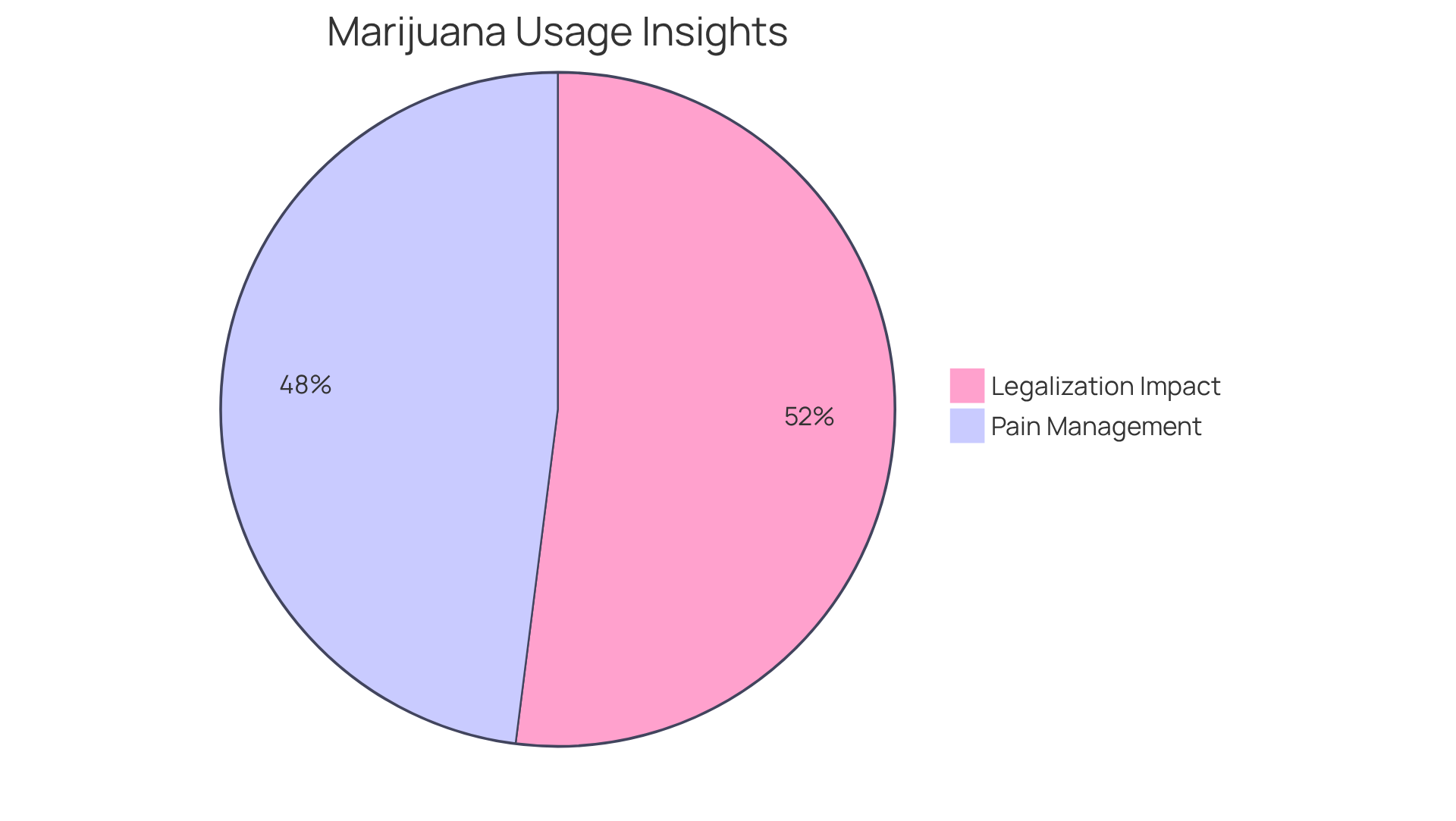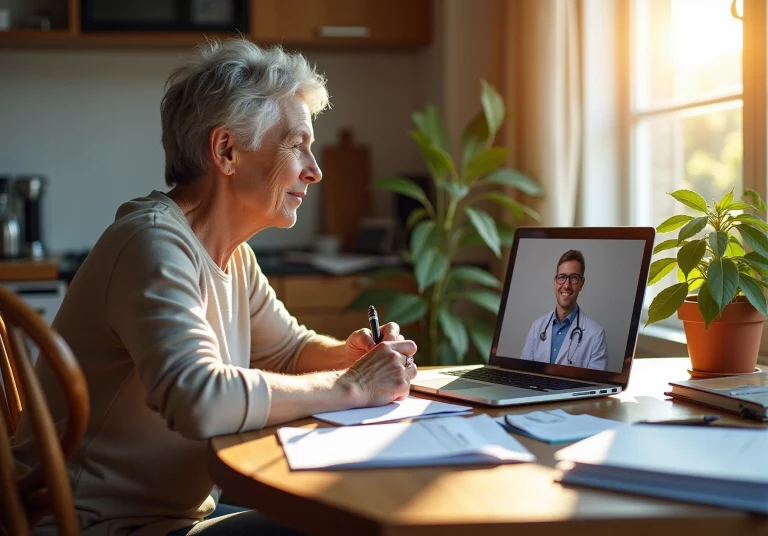7 Latest News on GA Medical Marijuana for Chronic Pain Patients
by Maya Green · August 30, 2025
Stay updated on the latest news GA medical marijuanas for chronic pain patients and more.

Overview
In recent times, Georgia’s medical marijuana program has made significant strides, particularly in enhancing accessibility for chronic pain patients through innovative telehealth services like Leafy DOC. It’s important to remember that many individuals face challenges in managing their pain, and streamlined access to medical marijuana can provide a vital lifeline.
Recent updates in guidelines for cardholders reflect a growing acceptance of cannabis as a legitimate treatment option. This shift not only validates the experiences of patients but also underscores the necessity for informed patient education. You may find that understanding these developments empowers you to make responsible choices regarding your health.
As we navigate this evolving landscape, it’s essential to approach the use of medical marijuana with care and responsibility. By staying informed and educated, you can take proactive steps towards managing your chronic pain effectively. Remember, you are not alone in this journey, and support is available to help you along the way.
Introduction
The landscape of medical marijuana in Georgia is evolving rapidly, bringing significant updates that impact chronic pain patients and their access to care. As the state embraces telehealth solutions and new legislative guidelines, individuals seeking relief from debilitating conditions can now navigate the complexities of obtaining medical marijuana more efficiently than ever.
It’s important to remember that while these advancements offer hope, there are rising concerns around cannabis safety, particularly for children, and the controversial relationship between medical cannabis and opioid prescriptions. This raises a crucial question: how can patients ensure they are making informed choices in this shifting environment?
You may find that understanding these developments is key to your journey. This article delves into the latest changes in Georgia’s medical marijuana landscape, offering insights and guidance for those navigating their treatment options. Together, we can explore how to approach these choices with confidence and care.
Leafy DOC: Streamlined Access to Medical Marijuana in Georgia
Leafy DOC provides a compassionate platform that connects individuals in Georgia with authorized healthcare experts for cannabis assessments. By simplifying the application process, individuals can easily schedule appointments, submit necessary forms, and obtain their marijuana cards without needing to visit in person. This is especially helpful for those with chronic conditions who may face mobility challenges or reside in remote areas, ensuring they can access essential care effectively. With our straightforward online application, individuals can enroll from the comfort of their homes, and our expert guidance ensures personalized care tailored to their medical needs.
It’s important to recognize that recent statistics show approximately half of registered individuals are dealing with chronic pain or cancer, highlighting a growing trend towards remote healthcare solutions. Effective uses of telehealth for managing chronic pain have led to improved outcomes and satisfaction among patients. Dr. Travis Bailey, an interventional pain physician, notes that online evaluations not only enhance accessibility but also maintain high-quality care, allowing individuals to receive timely assessments and recommendations from their homes.
You may find it concerning that Georgia’s Public Health Department has reported a significant miscount of active cannabis users, adjusting the figure from over 30,000 to around 13,000. This underscores the challenges in accessing care and the vital role platforms like Leafy DOC play in addressing these issues. Our testimonials speak volumes about the compassionate and effective telehealth services we provide, with individuals expressing gratitude for the ease of the process and the supportive care they received. By prioritizing individual needs, Leafy DOC simplifies the complexities of obtaining the latest news ga medical marijuanas in Georgia.
Georgia Health Department’s New Guidelines for Medical Marijuana Cardholders
In the latest news ga medical marijuanas, the Georgia Health Department has recently updated its guidelines for marijuana cardholders, highlighting the vital importance of responsible use and comprehensive user education. These revised guidelines provide essential information on dosage suggestions, potential side effects, and the legal implications associated with the latest news ga medical marijuanas. With approximately 13,000 registered individuals in Georgia’s low-THC marijuana program, it is crucial for users to keep up with the latest news ga medical marijuanas to utilize their medicinal marijuana safely and effectively.
Improved education empowers individuals to make informed choices and fosters a deeper understanding of the therapeutic benefits and risks related to therapeutic marijuana, particularly for conditions like chronic pain, anxiety, and epilepsy. As you explore options such as cannabis-infused honey, understanding its dosage and effects becomes essential for safe consumption. It’s important to remember that as the state continues to expand its medical marijuana program through legislative efforts like House Bill 227 and Senate Bill 220, the latest news ga medical marijuanas will be essential in helping individuals manage their treatment choices responsibly.
Notably, these bills, as highlighted in the latest news ga medical marijuanas, aim to update qualifying conditions—including anxiety, chronic pain, and epilepsy—and broaden the range of available products, while also adjusting possession limits. These changes are critical aspects of patient education, and staying informed with the latest news ga medical marijuanas can truly make a difference in your journey toward wellness. You may find that taking the time to understand these guidelines not only enhances your experience but also supports your overall health and well-being.
Rising Cannabis Poisonings Among Children: A Growing Concern
Recent reports reveal a troubling rise in marijuana poisonings among children, primarily due to the accidental ingestion of edible products. From 2017 to 2021, pediatric exposures to marijuana increased by a staggering 1,375%. In 2021 alone, over 3,000 young children unintentionally ingested marijuana edibles. This alarming trend underscores the urgent need for stricter packaging regulations. Currently, there are no federal rules mandating child-resistant packaging for marijuana edibles, which is concerning.
It’s important to remember that enhanced public awareness campaigns are critical. Educating parents about the associated risks can make a significant difference. Pediatricians emphasize that marijuana products should be kept securely, just like prescription medications, to prevent access by children. Experts recommend:
- Using child-proof containers
- Avoiding forms that resemble candy, such as gummies, to minimize the risk of accidental poisonings
You may find it helpful to recognize the symptoms of marijuana consumption in children, which can include lethargy, difficulty breathing, and seizures. Being aware of these signs is essential for every parent. As regulations develop in 2025, the emphasis on packaging safety will be vital in safeguarding at-risk groups from the hazards of edible products. Together, we can work towards a safer environment for our children.
Study Finds Medical Cannabis Access Does Not Lower Opioid Prescriptions
Recent studies suggest that access to therapeutic marijuana does not necessarily lead to a reduction in opioid prescriptions among individuals. This discovery challenges the prevailing belief that marijuana can completely substitute opioids in managing discomfort. It’s important to remember that while some individuals may decrease their opioid consumption when utilizing medical marijuana, the overall effect on prescribing trends remains complex.
For instance, a systematic review indicated that 32-59.3% of individuals with chronic discomfort reported using marijuana as an alternative for opioids. However, many still find that a combination of both therapies is essential for effective relief. You may find that discussing your options with a healthcare provider can lead to a more comprehensive pain management strategy.
It’s crucial for patients to have open conversations with their healthcare providers to explore all available options. Together, you can develop a thorough pain management strategy that carefully includes both marijuana and opioids when suitable. This collaborative approach ensures that your unique needs are addressed, fostering a path toward relief and well-being.
Illinois Launches Cannabis Research Institute: Advancing Medical Marijuana Science
Illinois has recently established a Cannabis Research Institute dedicated to deepening our understanding of marijuana for therapeutic purposes. This initiative is not just about research; it’s about exploring the potential benefits of marijuana, its effects on various health conditions, and the best ways to use it. Many individuals face persistent discomfort, which is the most reported condition for therapeutic marijuana use. The latest news regarding medical marijuana from this institute could significantly influence treatment options for those in Georgia.
It’s important to recognize that research indicates marijuana may lead to a clinically meaningful reduction in pain symptoms for adults. Many individuals have shared their experiences of finding considerable relief. As we see the credibility of therapeutic marijuana grow as a legitimate treatment alternative, advancements in research will be vital in shaping care and expanding access to effective therapies. Together, we can foster a better understanding and create pathways to relief for those in need.
Ohio’s Push for Recreational Marijuana Legalization: What You Need to Know
Ohio’s ongoing efforts to legalize recreational cannabis hold significant implications for those using marijuana for health reasons, particularly for individuals in neighboring states like Georgia. If this initiative succeeds, it may prompt a reevaluation of marijuana regulations and access across state lines. As recreational use becomes more accepted, patients could see changes in product availability and pricing, which may lead to increased competition and lower costs. In fact, average retail marijuana prices have decreased by 32% since 2021, suggesting a trend that could positively influence states like Georgia if similar laws are enacted.
It’s important to recognize how the legalization of recreational marijuana can also affect the medical marijuana landscape, as seen in states where both markets coexist. Individuals in Georgia should remain vigilant regarding these changes, as they could directly influence their rights and access to marijuana products. Experts in marijuana policy emphasize that adjustments in one state’s regulations can ripple into nearby states, altering user access and market dynamics.
As Ohio progresses with its legalization initiatives, the latest news regarding medical marijuana indicates that the potential consequences for cannabis users in Georgia and beyond are significant. Staying informed about these developments is crucial for patients who rely on marijuana to manage chronic pain and other qualifying conditions. Remember, you are not alone in this journey; being aware of the evolving landscape can empower you to make informed decisions about your health and well-being.
Exploring Medical Cannabis Benefits for Veterans’ Mental Health
Research indicates that medical marijuana can significantly benefit veterans grappling with mental health challenges, including PTSD, anxiety, and depression. In fact, studies have shown that marijuana users are over 2.5 times more likely to no longer meet diagnostic criteria compared to non-users, with a greater than two-fold rate of remission from PTSD diagnosis noted by the one-year follow-up evaluation. Furthermore, veterans using marijuana report substantial enhancements in sleep quality, with notable improvements in post-treatment total sleep score, subjective sleep quality, and sleep duration (p < 0.01). This makes marijuana a valuable addition to their mental health treatment options.
Personal narratives from Leafy DOC individuals further illustrate these benefits. Veterans have shared how the service allowed them to connect with compassionate doctors who understood their unique needs, leading to informed decisions about their treatment. One veteran expressed, “Connecting with a knowledgeable and compassionate doctor was a breath of fresh air. They took the time to explain the best options for my condition, and I felt heard and respected.”
In Georgia, where the latest news on medical marijuana indicates that therapeutic marijuana is recognized as one of the accepted conditions for medicinal marijuana, veterans are encouraged to consult with healthcare providers to explore the potential benefits of including cannabis in their treatment plans. To get started, veterans can easily book an appointment with Leafy DOC by submitting an intake form online, facilitating a seamless connection with licensed physicians via telehealth.
As shown by testimonials, many individuals have discovered Leafy DOC’s telehealth services to be fast and convenient, making the process of acquiring a marijuana card smooth and effortless. This is particularly important for those living in rural areas or facing mobility challenges. One patient expressed gratitude for the ease of accessing expert advice from home. With mounting evidence regarding its efficacy in alleviating symptoms and enhancing quality of life, medical marijuana presents a promising option for veterans seeking relief.
Cannabis Use Disorder: Understanding the Risks and Implications
Marijuana use disorder is a condition that can affect individuals who consume marijuana regularly. It’s important to recognize that this disorder can lead to dependence and negatively impact daily life. If you or someone you know is struggling, it’s crucial to be aware of the signs and engage in open discussions with healthcare providers about usage patterns. This dialogue can help ensure responsible and effective use of marijuana.
While medical marijuana can provide significant relief for chronic pain, it’s essential to understand potential side effects, such as drowsiness and dry mouth. These risks can be managed effectively by working closely with a healthcare professional. You may find that considering alternative consumption methods, such as edibles or tinctures, can offer therapeutic benefits without the adverse health effects associated with smoking. These options not only help manage symptoms but also provide a more discreet and convenient way to consume marijuana, which can be especially important for those concerned about stigma or health risks.
Engaging in a comprehensive approach to treatment, including discussing these options with your healthcare provider, can enhance the effectiveness of cannabis as a therapeutic tool. Remember, you are not alone in this journey, and taking proactive steps can lead to a more fulfilling and healthier experience.
Telehealth’s Role in Accessing Medical Marijuana: A Modern Solution
Telehealth has fundamentally changed access to cannabis, allowing individuals to connect with licensed healthcare professionals from the comfort of their homes. This innovation is particularly advantageous for those experiencing chronic pain or mobility challenges, as it removes the barriers of travel and long wait times. By utilizing telehealth services via Leafy DOC, you can receive timely assessments and effectively acquire your marijuana cards, often within just 24-48 hours.
At Leafy DOC, expert support is provided throughout the process, ensuring that care is tailored to your unique medical needs. Their user-friendly online platform makes it easy for you to schedule appointments, creating a seamless experience from start to finish. Simply fill out an intake form with your personal details and ID, then schedule an on-demand telehealth appointment or choose a convenient time for later. Many individuals have praised this process, with endorsements highlighting how clients completed their consultations in under an hour, showcasing the effectiveness of the service.
Research indicates that telemedicine not only enhances accessibility but also improves healthcare outcomes. For instance, individuals using telehealth for therapeutic marijuana consultations reported a 27% reduction in the risk of needing urgent care compared to those who did not utilize marijuana. Furthermore, studies show that medical cannabis can lead to a significant decline in emergency department visits, with those exposed to cannabis experiencing a 32.9% reduction in such encounters. This shift towards virtual consultations has made it easier for individuals to engage with healthcare providers, fostering open discussions about their treatment options.
As telehealth continues to advance, it is expected to play an increasingly vital role in managing long-term discomfort, offering a lifeline for those who may otherwise find it challenging to obtain essential care. The convenience of arranging appointments at your leisure further enhances patient satisfaction, making telehealth a favored choice for many seeking cannabis. Additionally, the extension of telehealth coverage for non-behavioral/mental services for Medicare beneficiaries through September 30, 2025, underscores ongoing support for these services. With chronic discomfort affecting approximately 20% of U.S. adults, the importance of accessible treatment options like telehealth cannot be overstated. As Mitchell L. Doucette notes, the latest news on medical marijuana shows that access to and utilization of therapeutic marijuana for chronic discomfort management has risen significantly over the last ten years, highlighting the evolving landscape of therapeutic marijuana access. Telemedicine not only reduces expenses associated with traditional in-person appointments, such as travel costs and time away from work, but it also fosters continuous communication between patients and providers, which is essential for effective management of chronic conditions.
The Evolving Landscape of Cannabis Research: Implications for Patients and Policy
The terrain of marijuana research is undergoing significant transformation, shedding light on both the therapeutic benefits and potential risks associated with medical marijuana. Recent studies reveal that marijuana is increasingly recognized for its role in managing chronic pain, anxiety, and other qualifying conditions such as PTSD, cancer, and multiple sclerosis. For instance, it’s noteworthy that approximately 48% of consumers seek marijuana specifically for pain management, underscoring its importance as a viable treatment option.
Moreover, there is a growing acceptance of marijuana within healthcare settings. A significant 52% of U.S. residents believe that legalizing marijuana has a positive impact on local economies. This shift in perspective is crucial for individuals, as it may influence their access to medical marijuana and the broader healthcare landscape.
As research continues to explore the relationship between marijuana use and health outcomes, it’s essential for patients to stay informed about the latest news regarding medical marijuana. This knowledge can empower you to make educated decisions regarding your treatment options. For example, studies indicate that marijuana may offer therapeutic benefits for mental health, with a notable reduction in suicidal thoughts reported among participants using marijuana for treatment.
The implications of these findings extend beyond individual treatment; they also play a vital role in shaping policy decisions that affect the latest news regarding medical marijuana and access in the future. As the body of research expands, it is likely to inform regulations and healthcare practices, ultimately improving the quality of care for patients seeking relief through medical cannabis.
It’s important to remember that knowledge is power. By staying informed, you can navigate your treatment journey with confidence and advocate for your health needs effectively.
Conclusion
The landscape of medical marijuana in Georgia is evolving rapidly, especially for chronic pain patients seeking relief. With platforms like Leafy DOC making compassionate care more accessible through telehealth, individuals can now navigate the complexities of obtaining medical marijuana cards with greater ease than ever before. This shift not only enhances accessibility but also ensures that patients receive tailored support from qualified healthcare professionals, ultimately leading to improved health outcomes.
Key developments, such as updated guidelines from the Georgia Health Department and the concerning rise in cannabis poisonings among children, highlight the importance of responsible usage and education. Additionally, ongoing research and legislative efforts aimed at expanding qualifying conditions for medical marijuana underscore the need for patients to stay informed about their treatment options. The interplay between medical cannabis and opioid prescriptions further emphasizes the complexity of pain management, revealing that a collaborative approach with healthcare providers is essential for effective relief.
As the conversation around medical marijuana continues to grow, it’s important for patients and caregivers to remain vigilant and proactive. By engaging with the latest news and research, individuals can better navigate their treatment journeys and advocate for their health needs. The advancements in telehealth and the expanding understanding of cannabis’s benefits present a promising future for those seeking relief from chronic pain and other qualifying conditions. Staying informed not only empowers patients but also contributes to a broader dialogue about the role of medical marijuana in contemporary healthcare.
Frequently Asked Questions
What is Leafy DOC and how does it help individuals in Georgia?
Leafy DOC is a platform that connects individuals in Georgia with authorized healthcare experts for cannabis assessments, simplifying the application process for obtaining marijuana cards. It allows individuals to schedule appointments and submit forms online, which is especially beneficial for those with mobility challenges or who live in remote areas.
What recent statistics highlight the need for platforms like Leafy DOC?
Recent statistics indicate that approximately half of registered individuals in Georgia’s medical marijuana program are dealing with chronic pain or cancer, demonstrating a growing trend towards remote healthcare solutions.
How does telehealth impact the management of chronic pain?
Telehealth has shown to improve outcomes and satisfaction among patients managing chronic pain, as it enhances accessibility while maintaining high-quality care through timely assessments and recommendations from home.
What has the Georgia Public Health Department reported regarding active cannabis users?
The Georgia Public Health Department recently adjusted the number of active cannabis users from over 30,000 to around 13,000, highlighting challenges in accessing care and the importance of platforms like Leafy DOC.
What are the new guidelines from the Georgia Health Department for medical marijuana cardholders?
The new guidelines emphasize responsible use and comprehensive user education, providing information on dosage suggestions, potential side effects, and legal implications for marijuana cardholders.
Why is it important for medical marijuana users to stay informed about the latest news?
Staying informed helps users make educated choices regarding their treatment, understand therapeutic benefits and risks, and navigate changes in the medical marijuana program, including updates on qualifying conditions and product availability.
What alarming trend has been reported regarding marijuana poisonings among children?
There has been a significant increase in marijuana poisonings among children, with pediatric exposures rising by 1,375% from 2017 to 2021, primarily due to accidental ingestion of edible products.
What precautions should parents take to prevent accidental marijuana ingestion by children?
Parents should store marijuana products securely, use child-proof containers, and avoid edible forms that resemble candy, such as gummies, to minimize the risk of accidental poisonings.
What symptoms should parents be aware of regarding marijuana consumption in children?
Symptoms of marijuana consumption in children can include lethargy, difficulty breathing, and seizures, making it essential for parents to recognize these signs.
What future regulations are expected to address packaging safety for marijuana edibles?
As regulations develop in 2025, there will be a focus on implementing stricter packaging safety measures to protect at-risk groups, particularly children, from the hazards of edible marijuana products.
Last Updated: August 29, 2025
Get Approved for Your Medical Marijuana Card in Minutes!

Get Your Medical Card
Connect with a licensed physician online in minutes

Like This Article?
Share with your friends
Table of Contents
Keep Reading
-
Convenient Delivery Services From Medical Marijuana Dispensaries In PA
Looking for convenient delivery services from medical marijuana dispensaries in PA? Click now to discover how you can get your cannabis delivered right to your doorstep. Don’t miss out on the ultimate convenience – order today!
-
4 Steps to Connect with Medical Marijuanas Doctors in Iowa
Connect with licensed medical marijuanas doctors in Iowa for your cannabis treatment journey.
-
Exploring Cannabis Meditation Techniques
Uncover the secrets of deep relaxation with cannabis meditation techniques. Elevate your practice and enhance your mindfulness with our guide. Click now to explore more and transform your meditation experience!

